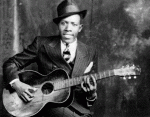Covering Robert Johnson’s Blues Became a Rite of Rock ‘n’ Roll Passage: Hear Covers by The Rolling Stones, Eric Clapton, Howlin’ Wolf, Lucinda Williams & More

American rock and roll originated from all corners of the country in the 1940s and 50s: from the exuberant gospel of the south, rollicking western swing of Texas, lean electric blues of Chicago, fast-paced Chicano music of L.A…. Truly a cultural melting pot, it represented the U.S to itself, amplifying and intensifying contemporary trends that continued right alongside the upstart new genre. But along with the deaths, arrests, and army stints of the music’s most famous stars at the end of the 50s, rock’s first wave suffered from a kind of creative fatigue, seeming to have done all it could with its source material.
British musicians who fell in love with Elvis and Little Richard saw a need to revitalize the music by reaching back to older forms—to the influences of rock and roll’s influences, most from the American South. First came skiffle, a jazz-blues-folk fusion born in the early-20th century U.S. It launched the careers of The Beatles and became huge in its own right as a popular British folk form of the 50s. Then came the massive influence of the Mississippi Delta blues, which gave The Rolling Stones, and virtually every band featuring Jeff Beck, Eric Clapton, or Jimmy Page, a reason for being.
Among Delta Blues players, no one contributed more to British invasion bands and the blues-rock explosion in the U.S. than Robert Johnson, the legendary Mississippi bluesman who is said to have traded his soul for his talent. Johnson’s evolution from relative obscurity in his lifetime to rock’s most revered ancestor in death is the story of the music’s rebirth. As Keith Richards put it:
To me Robert Johnson’s influence—he was like a comet or a meteor that came along and, BOOM, suddenly he raised the ante, suddenly you just had to aim that much higher. You can put the record on now, and it’s a fresh and interesting as the first day you heard it.
Never mind that Johnson died five years before Richards was born. For the generation just discovering him, the bluesman was a brand-new epiphany. All of them returned the favor, giving Johnson’s name immortal fame and covering his songs. How do their versions stack up against the originals? Compare for yourself in some classic examples here. At the top, see the Stones play “Love in Vain” live in Texas in 1972, and below them, hear Johnson’s recorded version.
Clapton leaned even more heavily on Johnson’s style than Keith Richards, turning Johnson’s iconic “Crossroads” into his own signature blues. Further up, see Clapton play “Rambling on My Mind” at Madison Square Garden in 2008. Just above, hear Johnson’s 1936 recording. The tradition of covering Johnson didn’t start or end with classic rock stars, of course. “Long before white British kids discovered him,” writes Stephen Deusner at Paste, “older black bluesmen were playing the hell out of Robert Johnson’s tunes, chief among them Howlin’ Wolf.” See Howlin’ Wolf, another hero of the Rolling Stones, play “Dust My Broom” below with his killer electric band.
Still, it took white musicians to bring Johnson’s music to white audiences outside of blues fandom, just as it took Clapton’s cover of “I Shot the Sheriff” to help Bob Marley cross over. After Cream, the Stones, the Yardbirds, etc., it became fashionable for everyone to cover Johnson’s songs, almost as a rite of rock and roll passage.
Lucinda Williams recorded a take of “Rambling on My Mind” for her debut album in 1979, Country-blues punks Gun Club released their manic, unhinged version of Johnson’s “Preaching the Blues” on their 1980 debut. The list of explicitly Robert Johnson-influenced musicians goes on and on, dwarfed by the list of musicians indirectly influenced by him. Hear the 10 best Robert Johnson covers, according to Deusner, at least, at Paste, and find all of Johnson’s original recordings for comparison here.
Related Content:
The Story of Bluesman Robert Johnson’s Famous Deal With the Devil Retold in Three Animations
Keith Richards Waxes Philosophical, Plays Live with His Idol, the Great Muddy Waters
Robert Johnson Finally Gets an Obituary in The New York Times 81 Years After His Death
Josh Jones is a writer and musician based in Durham, NC. Follow him at @jdmagness
Covering Robert Johnson’s Blues Became a Rite of Rock ‘n’ Roll Passage: Hear Covers by The Rolling Stones, Eric Clapton, Howlin’ Wolf, Lucinda Williams & More is a post from: Open Culture. Follow us on Facebook, Twitter, and Google Plus, or get our Daily Email. And don't miss our big collections of Free Online Courses, Free Online Movies, Free eBooks, Free Audio Books, Free Foreign Language Lessons, and MOOCs.
from Open Culture https://ift.tt/38J98Ap
via Ilumina
Comments
Post a Comment